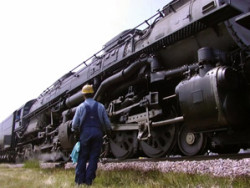 Railroad workers have either historically been or are currently still being exposed in varying degrees to carcinogens during their daily work performance. The degree and type of exposure depends of course upon their job titles – a train diver or conductor will have different exposures than a maintenance equipment operator, yardmaster or station manager.
Railroad workers have either historically been or are currently still being exposed in varying degrees to carcinogens during their daily work performance. The degree and type of exposure depends of course upon their job titles – a train diver or conductor will have different exposures than a maintenance equipment operator, yardmaster or station manager.
Railroad work can be linked to two types of cancer in particular: blood cancers and lung cancers. Blood cancers, such as Hodgkin’s lymphoma and myeloid leukemia, may stem from exposure to low-frequency electromagnetic fields (EMF). Lung cancers, including mesothelioma, may stem from exposure to diesel fumes and asbestos fibers.
Blood Cancers and EMF
A research project in Switzerland examined the link between certain types of cancer and railroad work.
Researchers followed 20,000 railway workers over a 30-year period and found that diagnoses of Hodgkin’s lymphoma and myeloid leukemia rose as documented exposure to EMF rose in the study subjects. A strong correlation was established with these types of blood cancer and railroad work. The workers with the greatest EMF exposure were train drivers or conductors.
EMF happen in the natural world. But there is also the man-made variety emitted from electrical appliances, wiring, and computers. No evidence exists that limited exposure to everyday devices and the EMF they generate promotes cancer in everyday people.
The issue at stake is the length of time the exposure exists. In terms of cancer and railroad work, the ones most at risk here are train drivers who spend long hours in train cabs near the vehicle’s electrical supply. Employers could limit this risk by increasing the distance between this supply and the driver in cab design.
Lung Cancers and Asbestos or Diesel Fume Exposure
A type of cancer that is far more generally common among the many other types of railway workers is mesothelioma. Mesothelioma stems from exposure to asbestos, an insulating material made from a group of minerals that has fire and heat as well as chemical resistant properties.
Even though it has been known for well over a 100 years that asbestos posed a health risk to humans, it was still widely used well into the late 1990’s.
Asbestos was used as an insulating material on all the major metal parts of trains including the engine, boilers, boxcars, cabooses, and pipe covering. It was also used to insulate train stations and was found in wallboard, sealing cement and plaster. Finally, it was also routinely used in major mechanical parts of train engines themselves such as brake pads, brake linings, gaskets, and clutches.
This link between cancer and railroad work may have legal implications that can result in compensation for affected workers.
The Federal Employer Liability Act, or FELA, provides a legal compensation mechanism by which workers who become injured or sick due to their railroad work can seek compensation. Bringing a FELA claim can be a complicated process, however, and potential claimants may benefit from a knowledgeable FELA attorney.
Do YOU have a legal claim? Fill out the form on this page now for a free, immediate, and confidential case evaluation. The attorneys who work with Top Class Actions will contact you if you qualify to let you know if an individual railroad worker cancer lawsuit or class action lawsuit is best for you. [In general, railroad worker cancer lawsuits are filed individually by each plaintiff and are not class actions.] Hurry — statutes of limitations may apply.
ATTORNEY ADVERTISING
Top Class Actions is a Proud Member of the American Bar Association
LEGAL INFORMATION IS NOT LEGAL ADVICE
Top Class Actions Legal Statement
©2008 – 2025 Top Class Actions® LLC
Various Trademarks held by their respective owners
This website is not intended for viewing or usage by European Union citizens.
Get Help – It’s Free
Join a Free Railroad Worker Cancer Class Action Lawsuit Investigation
If you qualify, an attorney will contact you to discuss the details of your potential case at no charge to you.
Please Note: If you want to participate in this investigation, it is imperative that you reply to the law firm if they call or email you. Failing to do so may result in you not getting signed up as a client, if you qualify, or getting you dropped as a client.
E-mail any problems with this form to:
[email protected].
Oops! We could not locate your form.












